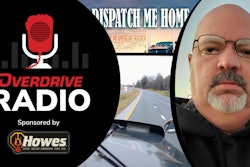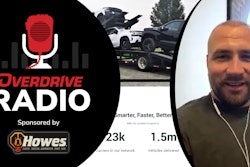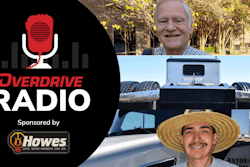This edition of Overdrive Radio in some ways picks up where Overdrive News Editor Matt Cole left off in his reporting from mid-late October around truck-involved crash statistics in the four years prior to, and the four years after, implementation of the FMCSA's electronic logging device mandate, which began in earnest right at the end of 2017. As many podcast listeners and Overdrive readers among you have likely seen, Cole’s reporting illustrated clearly the generally higher rates of crashes post-mandate, even considering the 2020 year when statistics were way down with the big decline in motorist highway traffic amid the fear and uncertainty of the early COVID pandemic.
So there’s a definite correlation between major regulatory change in the ELD mandate and those negative safety impacts, but can we really determine there’s a causal link there? Hard to say, given so many factors go into the cause of any crash, not least among those factors the “unprofessional” driving behavior of our four-wheeled friends.
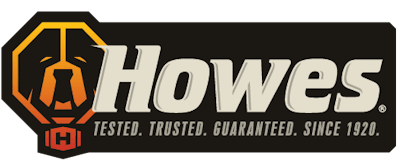 Overdrive Radio sponsor Howes is offering a prize pack including bottles of anti-gel fuel treatments DieselTreat and Diesel Lifeline, among other things, to those who leave voicemail on the podcast message line: 615-852-8530. Leave a message to claim yours. We'll be back in touch for your shipping information.
Overdrive Radio sponsor Howes is offering a prize pack including bottles of anti-gel fuel treatments DieselTreat and Diesel Lifeline, among other things, to those who leave voicemail on the podcast message line: 615-852-8530. Leave a message to claim yours. We'll be back in touch for your shipping information.

The question of cause and effect around the ELD mandate, though, is certainly a conversation starter for Overdrive’s owner-operator audience. Attendant to Cole’s reporting, we surveyed owner-operators, and the overwhelming majority feel the mandate has at least contributed to safety-negative effects.
[Related: Where to find a 14-hour-clock pause button -- in the new split-sleeper options]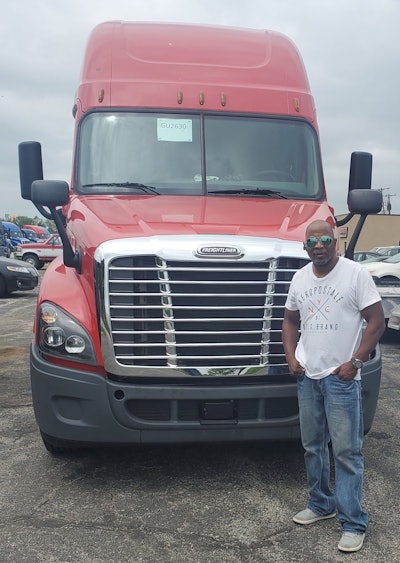 We can’t count Michigan-headquartered small fleet owner Bud Davenport among the majority who see some safety impact from the mandate, exactly. Yet Cole’s talk with Davenport is instructive when it comes to the state of play for driver training that other owners feel has been exacerbated by the mandate.
We can’t count Michigan-headquartered small fleet owner Bud Davenport among the majority who see some safety impact from the mandate, exactly. Yet Cole’s talk with Davenport is instructive when it comes to the state of play for driver training that other owners feel has been exacerbated by the mandate.
In the podcast, hear a variety of viewpoints on the cause-and-effect question, both from contributing reporting from video editor Lawson Rudisll surveying owners about the ELD mandate and any safety connection, or lack thereof, and Matt Cole’s own interviews for a broader picture. Take a listen:
[Related: ELDs and highway safety: Crashes, injuries, fatalities rise post-mandate]
Todd Dills: Here's hoping that the Thanksgiving holiday was a great one for you, whether braving increasingly cold climes all around the country on the road, or enjoying time off at home. I'm Todd Dills, your host for this post-Turkey Day edition of the Overdrive Radio podcast for November 25th, 2022. And we're going to revisit Overdrive News editor Matt Cole's reporting from mid to late October around truck involved crash statistics in the four years prior to and, the four years after implementation of the ELD mandate, which began in earnest right at the end of 2017.
As many in this audience have likely seen, Cole's report illustrated the generally high rate of crashes post-mandate. And yes, we're not just talking about general volume of incidents, but accident rates. Calculated both per estimated power unit and per estimated mile, with the exception of the 2020 year when crashes, injuries and fatalities all fell off a cliff with a dearth of four wheeler traffic on the nation's roads amid the fear and uncertainty of the early pandemic period. And you know, even considering that 2020 year, amid the four years post mandate, the four years prior to the mandate showed generally better safety outcomes than the four years after by this analysis.
So there's a correlation between regulatory change and the ELD mandate and those negative safety impacts, but can we really determine there's a cause there? It's hard to say, given so many factors go into the cause of any crash, not least among those causal factors, the often quote unquote "unprofessional” driving behavior of our four-wheeled friends. Just refer back to the 2020 year I noted earlier for evidence of that.
Questions of cause and effect around the ELD mandate though are certainly conversation starters for Overdrive's owner-operator audience. Attendant to Cole's reporting we surveyed owner-operators and the overwhelming majority feel the mandate has at least contributed to safety negative effects. Today we're going to hear a variety of viewpoints on the cause and effect question, both from contributed reporting from video editor Lawson Rudisill surveying owners about the ELD mandate and safety connection or lack thereof, and from Matt Cole's own interviews. If you missed Cole's report, find it at overdriveonline.com.
We can't count Michigan-headquartered small fleet owner Bud Davenport among the majority who see some safety impact from the mandate, exactly. Yet Cole's talk with Davenport is instructive when it comes to this state of play for driver training that other owners feel has been exacerbated by the mandate.
Bud Davenport: So I'm going to tell you, when I started driving, we had what we call old school drivers. They didn't run on clocks, they didn't run on … the government wasn't as tight on them as they are today. And when they trained you how to drive a truck, they trained you. They taught you courtesy, they taught you the rules of the road and what the rules of the roads were in that time. Well, the problem is all those old timers are gone and I'm the generation, I'm the last generation of drivers taught by old schoolers and we're talking guys from the sixties, the fifties. But I had trainers that been driving and I mean when I started driving in ‘89, I had guys that had been driving since ‘68, ‘65, and it was a different time. It was different trucks, these guys had pride in what they did and they were proud to be truckers.
So they passed that on to you. They passed that on to you. And even though we didn't have CDLs, I came into the industry before CDLs were invented. The CDLs came in 92, I came in 89, so had -- so I was grandfathered into CDLs, but I mean these were the best drivers. And when I got my CDL, when I got my commercial license or my chauffeur's license to drive trucks, I was trained not at a school. I was trained by a personal friend that owned a truck that was able to sign a piece of paper that said, I drove a truck for this many hours, for this many miles. I took it to my DMV, gave it to him, and I got my license and that's what it was, right? And then I was out driving. So as we got older and you get more experience and you really don't become a trucker until you get out on the road. So when you wipe out this generation of drivers like me, because the generation before me is now gone, so I'm first generation now. When this generation leaves, then we have these new drivers. Nobody's taught them how to drive a truck, how to be courteous, how not to be in a hurry. Take your time.
We lived under the theory that everything on this truck they make every day except you, right? Like everything on the truck, even the truck they make every single day except the person that's behind the wheel, they get in the trucks and they drive them like they drive their cars. Even our drivers, if you’re just out and about driving your car around, you see that the people that drive their cars are not like the drivers from the ‘80s and the ‘70s, they're different.
Everybody's in a hurry. You put your turn signal on to get over and you see them, they speed up and just close you out just for a space to go nowhere. Well they drive the trucks the same way you speed through the parking lots, 25 miles an hour. So your truckers are just different. And back in the day when we started driving you, it was a rule. Same gear you usually go up the hills, is the same gear as you use to go down. So now the trucks are so technically advanced that you can go up a gear, you can go up a hill in a way higher gear then you need to go down right on that other side. So the trucks that give you a false sense of security. And before you know it, you going down the hill way too fast and now you can't stop.
Todd Dills: We'll hear more from Davenport and several owners on the broader subject of what's changed or not right after the break for a word from Overdrive Radio’s sponsor, the Howes company, makers of leading anti-gel, winter fuel treatments Diesel Treat, and Lifeline, among many other products, some of which you can get free of charge with just a simple call to Overdrive Radio's podcast message line. Leave me a message at 615-852-8530 with your name and location, and I'll get back in touch with your shipping information for a Howes prize pack featuring both fuel treatments, the Howes Multipurpose penetrating oil, and more swag from the company. Again, that's 615-852-8530. Leave me a message there.
Speaker 3: With winter fast approaching, it's time to prepare yourself for the conditions that lie ahead. By adding Howes Diesel Treat at every fill up, you can prevent your diesel fuel from gelling in even the coldest temperatures. While it safely removes water, adds lubricity and prevents deposits, the nation's number one anti-gel will help protect your engine and provide you with the added power you crave. Backed by the only no tow guarantee, Howes diesel treat will keep you rolling no matter what weather comes your way. Learn more at howesproducts.com. Howes. Tested, trusted, guaranteed.
Todd Dills: OK, you've heard this owner-operator's voice before. Part of our last round of commentary from several owners who showed at the Mayberry Truck Show back in late September and early October in North Carolina about the then current prospect for a bonafide economic recession.
John Highley: My name's John Highley. I've been leased to Landstar for 20 years. I haul mostly specialized liftgate freight, entertainment, things that require a little bit of special attention. We do concert tours. A lot of things that, like I said, require extra equipment. We have the lift gate, we have ramps, lot of straps, full decking, a lot of extra equipment that we carry so we can do different things.
Todd Dills: Owner-operator, John Highley’s commentary on possible connections between safety outcomes the last four years since the ELD mandate came into play in some ways threads the needle between that and the degradation of training that small fleet owner Bud Davenport emphasized for its own safety implications, just a moment ago. John Highley took us back long before the US Congress required FMCSA to put a ELD mandate in place. In 20 2012.
John Highley: Years before the ELD mandate went through, myself and a group of other people found out that the FMCSA was looking at something along these lines. We tried to get drivers on board and completely failed with it. Nobody thought that it would ever happen. By the time people started getting on board to fight the ELD mandate, it was already a done deal. We basically predicted everything that we're seeing right now, but they didn't want to listen. They were more worried about statistics than anything else. A lot of times statistics will outweigh real life. We've seen the accidents go up. It's a bad idea. You can't put a stopwatch on a driver. Anytime that you're doing a job and you're being timed to do that job to a certain level, you're going to start rushing that job. And I don't know anybody that doesn't do a job, get in a hurry and then mess the job up.
It changed the ratio of drivers out here. We had a lot of older guys and we had a mix with the younger generation. That gave the younger generation the opportunity to see the older guys see their actions, see their driving habits and learn from them. While under the ELD mandate, most of us got into this industry because we like the freedom, we like the independence. A lot of guys that were close to the retirement age said, "we're done. If you're going to hold a thumb down on us, we're not going to do it anymore." That changed the ratio of the old guys to the new guys. So now all the new guys don't have those mentors, the older guys to follow. I was blessed starting into this. My dad was a driver, my dad's friends were drivers, so I had people that taught me all the time and just listening to the stories they told.
That's how I got my education. And then of course riding with my dad. These young folks today don't have anybody really to show them the ropes. And I think the ELD has been a, it's problem in so many ways. It forces you into drive time.
Back in the old days, if we want to say that, if you were going into a city in the middle of rush hour, it was very easy just to stop. Wait two or three hours, let the traffic die down. If there was an accident, let it die down. Decrease the amount of traffic that's in a highly populated area. There's no reason for you to add to the problem. I could stop outside of town, read a book, have a piece of pie, drink some coffee, whatever, wait for the situation to clean up and then go through. Now with this 14 hour clock, they push us to keep rolling because that day's ticking away on you. And I think it puts a lot of people in situations where they don't want to be there. I've seen more people since this ELD mandate started pushing faster than they should in inclement weather, whether it be rain or snow or whatever, because they're trying to beat that clock. And it hasn't been good. I mean, and the statistics show it, the accident rate has gone up consistently since this mandate went into effect.
Todd Dills: Cue 5F fleet-leased owner operator Mel Williams, also showing out in Mayberry.
Mel Williams: Well, when I first started, I was a company driver, so I was forced to use ELDs and the whole time I ran an ELD, I was aware 30 minutes can make or break your day. 30 minutes can determine whether you are sleeping at a truck stop that you are completely uncomfortable at and you're worried about your safety or you're sleeping somewhere where you can be comfortable and rest easy at night. I have been in situations where I've had to stop a mile before I was at my delivery to take a 30 minute break. I think that that's a little, I understand the purpose for it, the safety, I understand all of that, but I think that it is far too rigid and strict. I have had plenty of days where I'm exhausted, I've driven 200 miles, I'm exhausted, I got to stop and take a nap. And I've had other days where I'll drive the full 11 and I'm still wide awake. I feel like it regulates us and unfortunately we know our bodies well, not unfortunately. Fortunately, we know our bodies. We know when we're tired, we know when we're not tired.
Todd Dills: Owner-operator Williams went on to reference the pressure to go, go, go that so many feel is the number one psychological drawback of the ticking clock dynamics enforced by the hours of service now recorded with the electronic time clock. Hours rules themselves could be, she felt engineered to incentivize rest. There is, however, today a way to take at least two hours’ worth of that rest and not lose the time on your 14-hour duty clock. FMCSA's new split sleeper, in place since the 2020 hours changes made that possible for the first in a long, long time. Follow this link for a basic tutorial around that change.
Okay, next in the round of voices…
Austin Kiser: My name's Austin Kiser and I work for my dad, Greg Kiser, him and my grandpa, which is Gary Kiser. We have about 35 trucks pull pneumatic tanks, dump trailers and haul cattle.
Todd Dills: Kiser's thoughts about the connection between safety outcomes and the ELD mandate was short, simple to the point and reflected a view shared by many when we polled operators on ELD impacts. Mandate, they said, and as owner operator, John Highley you heard also reference, further disincentivized downtime mid-shift, increasing congestion, and the very opportunity for mishaps.
Austin Kiser: When I was on the road when I was trucking on the road, really, I thought it was a negative impact just because you had so many trucks trying to get into a truck stop somewhere. You couldn't get a parking spot. Somebody's dead tired, you couldn't, you might to travel another hour to find somewhere to park. And I don't think it's positive at all, but I mean there's some cases I guess it could be, but in most cases I think it makes it a lot harder on the truck driver, is what I think.
Todd Dills: And next in the round, trucker John Rooney.
John Rooney: My name is John Rooney. I've been driving for almost 31 years and I drive officially for R&L Carriers. I'd say it's having a negative impact. There's plenty of studies out there to prove that it's not safer. I'm exempt, so I don't have to use it, but plenty of our drivers do have to use it. And even for what we do, it gets in the way and we should be able to drive when we want to drive and sleep when we need to sleep. And it doesn't allow for that. When I was on the road, I run 48 states and three provinces of Canada, and if you got tired, you just parked it and took a nap and you got back going and you worked your logbook out later. It was a lot safer. I mean, now you've got drivers that just have to push themselves to get somewhere because the eLog let them, it doesn't give them that freedom. They have to, if they take a break, it's got to be for 10 hours.
Todd Dills: Well, it doesn't have to be, exactly. As noted previously it is at least possible to use the 2020-instituted split sleeper berth periods to effect without being penalized in your duty day. Too many newer drivers just aren't aware of their options in that regard. And many ELD systems out there, as we previously reported, just don't handle the new split sleeper very well to make those options obvious. There's no electronic substitute to just knowing the rule and hey, we're back to primary importance of training, of course. Rooney went on echoing other commenter prior thoughts on increased pressure to just go, go, go.
John Rooney: It's not safe for the driver and not safe for the general public because they're forced to do things. With the old logbooks, we weren't forced to drive the truck. We did. And when it was time to not drive it, we didn't drive it. That's been taken away with the elog, not a fan,
Lawson Rudisill: I can tell.
John Rooney: Yeah.
Todd Dills: And owner-operator Brent Hall voiced similar concerns. He also brought up the specter of previously-ELD exempt trucks with pre-2000 engines coming under the mandate in the future. Just last week, the comment period FMCSA opened a couple of months ago in part asking the question of whether ELDs might be applied to post 2000 model year glider kits with older engines in them. That comment period just recently closed. At the time, it was fresh on the minds of many and often interpreted I think more broadly than might be warranted to have signaled an agency intent to fully require some kind of electronic hours accounting for all pre 2000 trucks. Really, though, their question pertained directly to newer gliders. Nonetheless. …
Brent Hall: Brent Hall from North Mankato, Minnesota. Just a single truck owner-operator, Hall’n Transport. Got a 386, white 386 Fitzgerald Glider started out and just been modifying it from there. Do a drive [inaudible] and reefer freight, little tank business here and there. The ELD mandate. I think it's been not a good scenario for the trucking industry. And then now they want do the 99 and older, which I think myself, that you can't force everyone to do something when the computer tells you to. Everyone's loads are different. Everyone's rates are different. I mean, every commodity's different. No matter what you're pulling. That it's to the point where you can't have everyone be a robot. And you got to let people do what they can do and how they can do it and when they want to do it, within reason of the law book. But it's a tough call for everyone to do. I'm not a big proponent of the ELD itself. I'm kind of more, whether you want to call it old school or what, I've been doing this for 25 years and been through the ups, upside the downs.
Todd Dills: Next up …
Troy Massey: My name's Troy Massey, owner of Tri-State Vacuum and Rental and also Massey Motor Freight out of Nacogdoches, Texas. We operate a fleet of tanker trucks out of Nacogdoches, Texas, and then also a smaller fleet of reefer trucks that run over the road. About 325 total units. My wife and I, Abby Massey.
Todd Dills: Fleet owner Massey also referenced the notion that substantially all pre-2000 trucks and engines and might one day be required to use an ELD.
Troy Massey: I'm a pretty positive guy, so I'm a glass half full guy. Guys, we knew this was coming. I mean it's coming and you can either get behind it and you can be resilient and you can figure out a way, or you can say, I've had enough and this is not for me. What I will do is say, "it's just the way it is now." And I don't know that I got much more opinion on it than that. It's just all of my trucks are new. So I think I've got two ‘99 models, so it won't affect us any. And I don't know, I guess my thought on it is if I summed it up into one saying is what I tell all the truck pushers and the load bookers that work for us. I think about it like this from business standpoint, I guess this is probably the best way I could sum it up.
If you have to drive more than 14, or I say drive. When I say, I don't want the internet army to come after me for dissecting the 14 hour rule. I understand what's 14 hour rule is. But if you have to work more than you're 14 allotted hours to make money, then your work is not paying enough. So that's really my view on the whole thing. So if you've got to work more than 14 hours a day, 11 hours driving or 12 hours on time sheet or whatever it is, system that you use. If you have to work more hours than that, then you didn't bid enough on your work, you got to bid more. And I guess that's, that's probably my final thought.
Todd Dills: Finally, we'll come back full circle to small fleet owner Bud Davenport. Hearing his commentary on training, on the restoration of pride in the business, I can't help but think that, he doesn't see it, not directly anyway. I can't help but think that the ELD mandate has in fact impacted bedrock safety. It's well likely that the more and more narrow focus on compliance, on taking the quickest route toward it to get a driver on the road make money, has come at the expense of the bigger safety picture. From Davenport's vantage point, after a long career on the road, that's not a pretty picture, that at least, is sure.
Bud Davenport: I see these trucks tailgating these cars and I'm like, "man, I would not want my family around this guy."
He can't stop. He can't stop. Yeah. And I think that that's the biggest problem is that we're not training these drivers. We have to teach pride. We have to teach safety. And these companies today, they're just in such a rush to get somebody behind the wheel and move their products to make money. But the companies are not taking time to teach pride, to teach safety and to teach respect, because you have to respect that truck. You don't respect that truck. It will take you out. And I tell people all the time, listen, you got one... You can disrespect this truck one, a thousand times, but it only take one time for the truck to disrespect you.
You can drive as fast as you want to drive, as many times as you want to do it, but as soon as that truck disrespects you, you along for the ride that it's going to take you on. Right? And that's not a ride you want to go on. So I'm going to tell you, 3 million miles, 3 million and I'm going to knock on some wood, accident free miles.
Accident free miles. And what it is, I don't do what I'm not comfortable doing. When I start, there's a combination. If it's ice and snow, I don't go. I wait for the roads to clear. And it's not that I haven't. When I was a young man, I would go out, I don't care what I was doing, it could be three feet of snow on the ground, I'm going to go. Roads were going to freeze. But as I got older, I realized it's not worth the risk. It's not worth the risk of my life, or the risk of liability because it doesn't happen. When you slide off the road, it's always your fault.
It's not the snow's fault. You shouldn't be out there.
So I don't go. I see these guys driving these trucks like they drive their cars and you just can't do it. So that's why you see a rise in these accidents and uptake. And it has nothing to do with the logs. It's all the drivers. It's all the drivers. So we have to bring this pride back into what we do because we are the backbone of this country. We keep this country moving, and I think that there probably needs to be a push that this country needs to push the people that listen, "these are our men and women out here, risk in our lives every day to make sure that this country stay moving, that you get the goods that you need." Because there's nothing that you touch, wear, smell, or taste. So yeah, it is. That's what we have to do. And it has nothing to do with electronic logs and government mandates. It's the people.
Todd Dills: Thanks for listening. Thanks for thinking.


